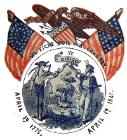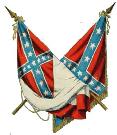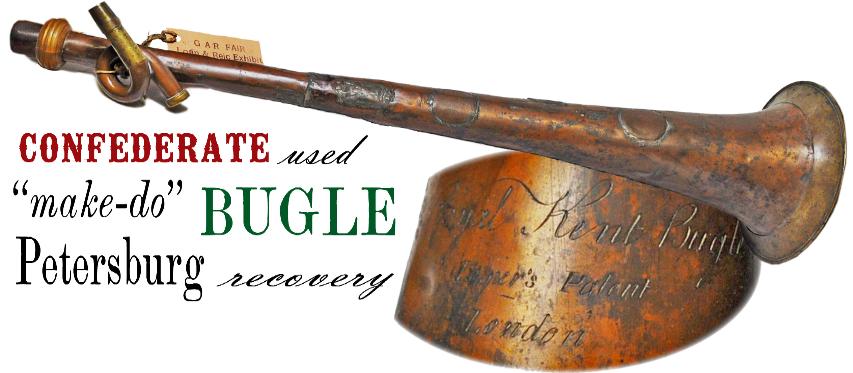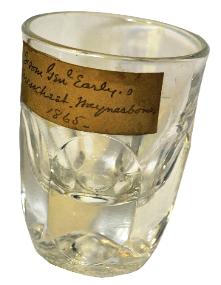




This Confederate used make do bugle is maker inscribed Royal Kent Bugle Logier’s Patent London and bears a G. A. R. fair tag identifying the relic simply as:
Rebel Bugle – Petersburg
loaned by
Comrade William W. Wentworth
Developed around 1810 and generally referred to as the Royal Kent Bugle in honor of the British Duke of Kent, the Logier’s patent, six keyed bugle, was considered obsolete by the time of the American Civil War. This Confederate make-do appears to have been heavily damaged so as to be unusable but was pressed into continued service by removal of its keys with the ports covered by lead soldered sheet copper patches. Whether the loop section had been crushed leaving the instrument unusable or it was simply removed to make the thing easier to carry, must be left to speculation. The alteration was completed by application of a turned horn ferrule to accept a standard period pigtail and mouth piece, the mouth piece having been lost in time. An interesting example of ingenuity in a war time South stripped of so much with no reliable means of replacement.
William W. Wentworth was a Sanford, Maine resident when he entered the military service as Pvt. of Co. F 8th Maine Infantry. Detailed as a U.S. Army General Hospital Nurse for a period sometime in 1863, Wentworth would re-enlist in March of 1864 and would serve until discharge May 28, 1865. In this period Wentworth’s 8th Maine took part in the following important engagements: Drewry’s Bluff, losing 96 men, killed, wounded or taken prisoner; Cold Harbor, where it lost 79 men and the operations before Petersburg, losing 50 men. The 8th Maine was at Chaffin’s Farm and at Fair Oaks, where it again lost heavily. Though William Wentworth resided in Massachusetts in his later years where he was a member of the GAR, the loan of this war relic to a Maine Post is a reflection of his remaining ties with his home state and fellow veterans.

mess chest, Waynesboro
1865
This heavy old whiskey tumbler bears period evidence of having been taken from Lt. Gen. Jubal Early’s mess chest at Waynesboro Virginia. It was here on March 2, 1865 that Early’s force was nearly destroyed with the Confederate commander and his staff narrowly escaping over the Blue Ridge Mountains. The who and how of the spirit tumbler’s capture and return to Maine for safe keeping, has been lost in time.






